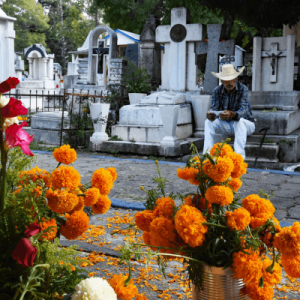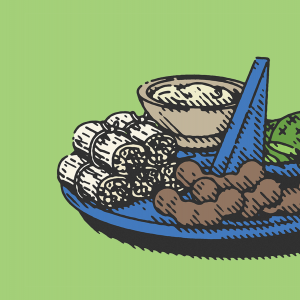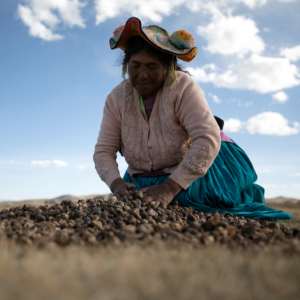
Sandy Ovalle is a table-setter and space-curator, rooting her work in the deep faith and strength of Chicanx and Latinx spiritual teachers. She is a native of Mexico City. A mujerista theologian and an organizer, she currently serves as the senior director of campaigns and mobilizing for Sojourners in Washington, D.C., leading SojoAction, the mobilizing arm of Sojourners. In her role, Sandy oversees mobilization and activist engagement around different justice areas including climate and environmental justice, immigration, women and girls, and peace and nonviolence. Before this, she worked with immigrant and refugee communities, providing direct legal and resettlement services as well as mobilizing faith groups for advocacy around issues that impacted these communities. She has worked in campus ministry with college students in Texas and California. She holds an M.A. in theology from Fuller Theological Seminary. Sandy loves writing poetry and gathering people around a table full of homemade pozole.
Posts By This Author
Día de Muertos Reminds Christians To Grieve
I am not interested in a commercialized version of Día de Muertos; parades, concerts, and celebrations where I must buy a ticket are an invention of capitalism. I am interested in the family remembrance rituals, in the nights at the cemetery communing with loved ones, in the ofrendas set up in homes, schools, and public plazas.
My Latine Christian Faith Embraces What Western Faith Demonizes

A cleanseañera ceremony in San Diego hosted by Puentes Collective. Image courtesy of the author.
Many Latines living in this country have adopted a form of white, Western Christianity that has come at a great cost to our cultural identity, our communal connection, and our sense of belonging. We’ve faced the tension of embracing a faith marked by discourses that demonize Indigenous, Afrolatine, and mestizo wisdom and spiritual practices. In trying to live out our new faith values, we wrestle with continuing to trust the goodness of the traditions and saberes in which we were raised. If we have internalized the air of superiority that white, Western Christianity breathes, we are at risk of losing the very wisdom that allowed our people to resist the dagger of colonization. But our bodies, our hearts, and our communities often clamor to remember, and they will not go silent.
Five Ways To Accept God's Invitation of Rest This Summer
Summer is so active, there is hardly any time to block off for spiritual renewal. Work with that. Do you have five minutes between lunch and packing to go out? Breathe. Say a short prayer. Pause. Drop your shoulders and check in with your body. Spiritual renewal does not have to be elaborate; work it into a rhythm in your daily transitions.
U.S. Immigration Policy Kills. Where Is the Church?
I am not sure what else needs to happen so the entire U.S. church wakes up to the realities of the evils entrenched in our immigration system. Honoring the dignity of all people is our calling as Christians; no other entity is tasked with recognizing the image of God in every person. Our Latine brothers and sisters are leading the way, but the whole church should be outraged; we should be demonstrating without ceasing. We should not let people sleep until they see the humanity of every migrant.
Our Climate Crisis Demands Indigenized Thinking, Not Colonial Logic
Colonial logic, when applied to political systems, protects power and controls the public narrative. When world leaders use generic terms like “humanity” or phrases like “all humans are responsible for the crisis,” it conceals the responsibility of governments and large corporations. By pointing to humanity in general, they imply that we are all equally responsible for the climate crisis and invisibilize the efforts of Indigenous leaders in the fight for climate justice.
Working Through to the Early Hours
“HAY MÁS TIEMPO que vida” was my dad’s refrain every time I was stressed and weary. “There is more time than life.” His simple words had profound implications.
Being present to life is difficult. Life demands that we “rise and grind.” Reward comes to those who make the most of the time they’ve been given. Time is money. Time is a commodity we trade. The promise of life is the goal of all this grinding—or retirement, if we are privileged.
During the pandemic, I’ve pushed against beliefs that commodify time. I’ve cooked the foods that nourished my ancestors: tamales verdes, atole de tamarindo, and nopalitos. My senses have been awakened through mixing the nixtamalized corn flour with water and fat until it reached the right texture, peeling and deseeding each tamarind pod, cutting the nopal (cactus) and cooking it with a few tomatillo husks to remove the slime.
The preparation of these foods forces me to notice the rough spots on the cacti where thorns still make their home, to smell the acid scent of tamarind in the pulp clinging to my fingers; it invites me to play with the unruly dough that believes its place is on top of the corn husk and not inside. If death shows up in separation, life sprouts in connection.
Embracing Ancestral Wisdom to Fight Extreme Weather
Modernity claims humans are the only citizens — the owners and rulers of nature – thus fracturing our relationship with nature and with one another as we compete to amass or inherit resources. This voracious system is built to protect those with wealth and their resources rather than to protect human and natural life. The deadly consequences of this paradigm are evident: Last month, the United States experienced the hottest June on record since we began keeping track 127 years ago.
U.S. Imperialism Is the Problem, Not Unaccompanied Minors
This March, U.S. Customs and Border Protection agents encountered nearly 19,000 unaccompanied children at the U.S.-Mexico border — a record high. To many, this number was shocking; media outlets used militaristic language to describe the arriving minors as a “surge.” However, this influx is not surprising given seasonal migration patterns and the horrific immigration policies instated by the Trump administration — policies the Biden administration has not yet repealed. The current administration must address the immediate needs of people seeking refuge at the southern border while also tackling the root causes of forced displacement and migration: U.S. imperialism.
A Liturgy for Celebrating the Holidays Apart from Loved Ones
The Centers for Disease Control and Prevention recommend celebrating the holidays only with the people you live with. In this recommendation, I hear a resigned invitation to make it work with what we have. Let us draw lessons from those who have long had to make it work. And in that, I offer a prayer.
Who Gets a Vote in God's Beloved Community?
Immigration is never out of sight for those whose lives depend on it, even while it may have not been a topic of choice for presidential and vice-presidential debates this year. Candidates and lawmakers on both sides of the aisle have used the stories and experiences of immigrant people for political gain. But for many immigrant people, engaging in the larger immigration discourse and advocacy work is primarily about our families and our communities: their present reality and their future opportunities. It is not about touting a “welcoming” nature or defending a seemingly attacked territory or national identity as politicians and others have often approached it.
Racist Immigration Narratives Lead to Racist Laws
IN JUNE, NEARLY 700,000 DACA recipients could breathe a sigh of relief when the U.S. Supreme Court ruled against the Trump administration’s decision to rescind the Deferred Action for Childhood Arrivals program. The court determined that the basis for President Trump’s action was “arbitrary and capricious.” The grounds presented for termination failed to consider the impact of the program’s rescission, wrote Chief Justice John Roberts.
The grounds of the ruling are important because the court did not address whether DACA was legal. For now, DACA remains fragile. People who have benefited from the program, put in place by executive action under President Barack Obama in 2012, can continue to obtain valid work permits and are protected from deportation. An estimated 130,000 people would have been eligible to submit new applications for the program, except that the Trump administration released a memo on July 28 saying it would “reject all initial requests for DACA and associated applications for Employment Authorization Documents.”
This momentary reprieve and upsurge of hope resulted from decades of fierce social, political, and legal organizing by undocumented youth and their supporters, often at great personal risk. The Trump administration may decide to attack DACA again. It would likely be a costly undertaking since a substantial bipartisan majority of Americans support DACA.
While DACA prevents the eviction from the U.S. of a sector of immigrants, it does not dismantle the massive deportation machine that operates in this country nor create a pathway to citizenship—key components of comprehensive immigration reform. Authentic immigration reform begins with the recognition that U.S. immigration laws, from their inception, have been informed by discriminatory narratives. The first immigration law, the Naturalization Act of 1790, made it possible for those born elsewhere to become citizens—but only if they were “free white persons” (“white” meaning certain Europeans, and “persons” essentially meaning men), excluding enslaved people, Native Americans, those without property, most women, and all others not defined as white. Only property-owning white male citizens could vote.
Savor and Strategize: The SCOTUS Decision to Protect DACA
Even as we allow ourselves to savor this victory and be lifted by the hope of this moment, we also need to prepare and strategize for what’s next, because the fight for immigration justice is far from over. The justices of the Supreme Court did not rule on the merits of whether Trump is allowed to end DACA — but rather on the way in which he attempted to do so.
The Rest Is Only Temporary
Immigrants have been willing to carry these oppressive burdens because there are no other options to make a way for our status in the system. The mantras playing in our head are the horrific echoes of a system that values immigrant people because of their economic contribution and slowly takes away their breath in favor of building an empire.
'Threats of Annihilation Live in Our Bones': The Enduring Resilience of Latinx Communities
Some Latinx people have known — and others have suspected — this land is not safe for us, but the extent to which that suspicion has been confirmed in El Paso is terrifying. The perpetrator in this massacre was deliberate in his plan to counter the “Hispanic invasion.” It’s tempting to believe all this has been incited by the current president’s violent rhetoric. But while that rhetoric has added much fuel to the fire, the fire has been burning for a long time.
Immigrants Across the Country Are Using Hunger Strikes to Protest Inhumane Detention
Hunger strikes allow detained immigrants to regain their agency while simultaneously throwing themselves on the mercy of the very institution that has oppressed them.
29 Parents of Separated Children Allowed to Cross Border, Seek Asylum
Luisa bought a ring for her daughter Katherine’s quince. She hopes to give it to her in a few months on her 15th birthday. But just in case she is not able to do so, she mailed it ahead of time to friends in the U.S. The two were separated on Christmas Day 2017 at the U.S.-Mexico border.
A Pilgrim's Journey
Migrant people hold the now and the not yet in tension. In the midst of waiting to make it up north and taking their turn for a credible fear interview at the border, life continues. People find ways to feel alive, to keep hope alive. At La Casa del Peregrino, holding on to hope looked like doing karaoke, coloring banners, and making beaded bracelets. They were not devoid of life.
Fear Is Not a Faithful Response to Those Seeking Asylum
Requesting asylum by presenting at a point of entry is the legal way to seek protection; it's not an assault on this country. To "other" brown-bodied people is destructive, especially if they’re in vulnerable situations, because it creates categories that automatically view some as superior. This has been the basis for many of the world’s greatest tragedies. Fear is the basis of all of these accusations.
















